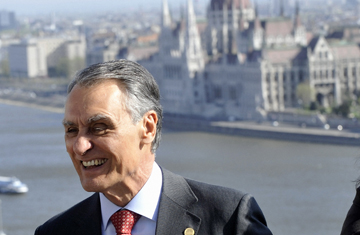
President of Portugal Aníbal Cavaco Silva laughs after a family photo on the terrace of the presidental palace at Buda Castle in Budapest on April 9, 2011
One year from now, will the euro be a viable currency?
It will be a worldwide credible currency. Integration is the most important asset Europe has, and the key component to European integration is
the euro. In one year's time, in 20 years' time, the euro will be here.
What is the next phase of the crisis?
The next phase is a solution. Political changes are taking place in Greece and Italy. But it took too much time for European and world leaders to recognize that no country, no region, is safe from the risk of contagion.
How realistic is China participating in a euro-zone rescue?
China's per capita GDP is less than half of that in Greece. And they have to ask, If Europeans don't want to put enough money in the European Financial Stability Facility, why would we? What they said is that they are prepared to perhaps put additional resources in the International Monetary Fund.
What went wrong in Portugal?
After the accession to the euro zone, interest rates declined substantially in Portugal. So domestic demand increased, indebtedness increased, external debt increased and deficits increased — and we are now correcting those mistakes.
Is Portugal on track to meet all its obligations for the bailout it received this year?
We are going to achieve the targets that we negotiated with the IMF and the European Union for the public debt, and we are implementing structural measures to improve productivity.
What are the challenges Portugal faces?
The Portuguese economy may decline 2.8% next year, so our challenge is to prove it's possible to do better than that. The locomotive of the Portuguese economy is exports. Investment is going to improve, but that depends on confidence and the trust of investors.
What happened with Greece?
Sometimes we are compared with the situation in Greece — no comparison at all. In the end, it was recognized that it was impossible for Greece to repay in full. Italy, it's a completely different problem.
And what problem is that?
The savings rate in Italy is high, but the markets do not trust Italy even though it's the third largest economy in the European Union, and the eighth in the world. So it's not a problem of solvency; it's a problem of liquidity.
Is Prime Minister Silvio Berlusconi's departure a positive development for Italy?
A President from a partner nation should not make comments on Italian politics. The new Prime Minister, Mario Monti, is a very able man. The markets do not just care about the measures, but also about politicians, about the person who is in charge.
What impact do you think the Arab Spring will have on Portugal?
I think it's a positive development. They're neighbors of ours. There are important Portuguese companies operating in Libya, operating in Egypt, in Algeria, in Morocco. Now it's a matter of how to help them build healthy democratic institutions. Europe should be deeply involved in the consolidation of the democratic process.
